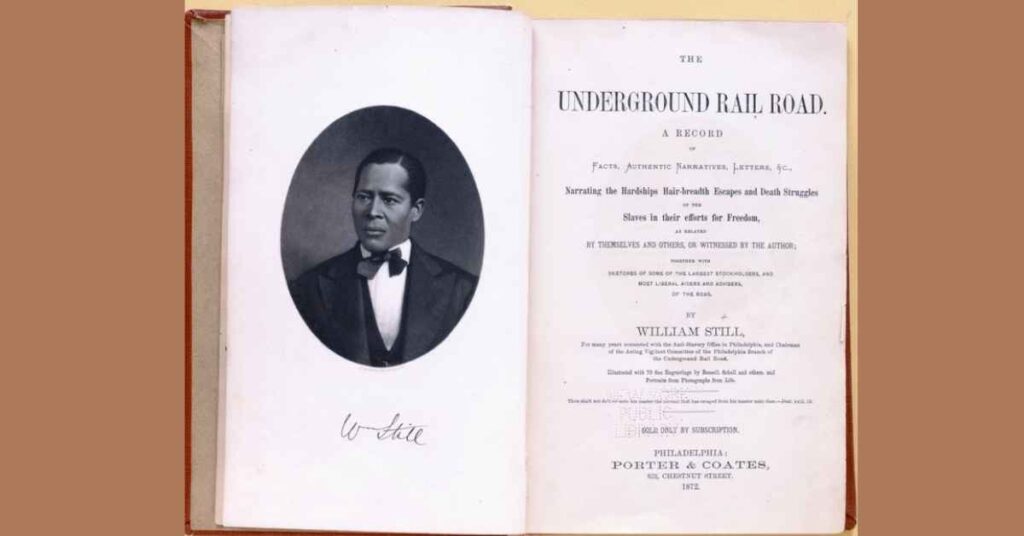This excerpt from “The Underground Railroad” by William Still documents the escape of a group of fugitives from Cambridge, Maryland.
Because another fifteen had escaped a few days earlier, the journey was even more dangerous. Every owner and slave-catcher were on the alert.
The excerpts in this article concern these brave members of the group:
- William Griffin
- Henry Moor
- James Camper
- Levin Parker
[The headings and italicized text in the excerpts below were added by the website editor. The rest is verbatim from the book. However, I have changed the order of some of the sections as I found the book presentation a little confusing.]

Excerpt From The Book – Armed For The Journey
Being aware that fifteen had left their neighborhood only a few days ahead of them, and that every slave-holder and slave-catcher throughout the community, were on the alert, and raging furiously against the inroads of the Underground Rail Road, they provided themselves with the following weapons of defense:
- three revolvers
- three double-barreled pistols
- three single-barreled pistols
- three sword-canes
- four butcher knives
- one bowie-knife
- one paw.
A paw is a weapon with iron prongs, four inches long, to be grasped with the hand and used in close encounter.
Thus, fully resolved upon freedom or death, with scarcely provisions enough for a single day, while the rain and storm was piteously descending, fathers and mothers with children in their arms (Aaron Cornish had two)—the entire party started.
Of course, their provisions gave out before they were fairly on the way, but not so with the storm. It continued to pour upon them for nearly three days.
With nothing to appease the gnawings of hunger but parched corn and a few dry crackers, wet and cold, with several of the children sick, some of their feet bare and worn, and one of the mothers with an infant in her arms, incapable of partaking of the diet, – it is impossible to imagine the ordeal they were passing.
It was enough to cause the bravest hearts to falter. But not for a moment did they allow themselves to look back.
It was exceedingly agreeable to hear even the little children testify that in the most trying hour on the road, not for a moment did they want to go back.
William Griffin
William is thirty-four years of age, of medium size and substantial appearance.
He fled from James Waters, Esq., a lawyer, living in Cambridge. He was “wealthy, close, and stingy,” and owned nine head of slaves and a farm, on which William served.
He was used very hard, which was the cause of his escape, though the idea that he was entitled to his freedom had been entertained for the previous twelve years.
On preparing to take the Underground, he armed himself with a big butcher-knife, and resolved, if attacked, to make his enemies stand back.
His master was a member of the Methodist Church.
Henry Moor
Henry is tall, copper-colored, and about thirty years of age.
He complained not so much of bad usage as of the utter distaste he had to working all the time for the “white people for nothing.” He was also decidedly of the opinion that every man should have his liberty.
Four years ago his wife was “sold away to Georgia” by her young master; since which time not a word had he heard of her.
She left three children, and he, in escaping, also had to leave them in the same hands that sold their mother. He was owned by Levin Dale, a farmer near Cambridge.
Henry was armed with a six-barreled revolver, a large knife, and a determined mind.
James Camper
James is twenty-four years of age, quite black, small size, keen look, and full of hope for the “best part of Canada.”
He fled from Henry Hooper, “a dashing young man and a member of the Episcopal Church.” Left because he “did not enjoy privileges” as he wished to do.
He was armed with two pistols and a dirk to defend himself.
Noah Ennells
Noah is only nineteen, quite dark, well-proportioned, and possessed of a fair average of common sense.
He was owned by “Black-head Bill LeCount,” who “followed drinking, chewing tobacco, catching ‘runaways,’ and hanging around the court-house.”
However, he owned six head of slaves, and had a “rough wife,” who belonged to the Methodist Church. Left because he “expected every day to be sold” – his master being largely in “debt.”
Brought with him a butcher-knife.
Levin Parker
Levin is twenty-two, rather short built, medium size and well colored.
He fled from Lawrence G. Colson, “a very bad man, fond of drinking, great to fight and swear, and hard to please.”
His mistress was “real rough; very bad, worse than he was as ‘fur’ as she could be.”
Having been stinted with food and clothing and worked hard, was the apology offered by Levin for running off.
About The Book
“The Underground Railroad” was published in 1872. The book gives the testimonies of hundreds of slaves who escaped to freedom using the network of agents and safe houses.
The author, William Still, was a black abolitionist and businessman who was a key member of the Philadelphia stop in the freedom network.
The book is in the public domain. It can be found in the Library of Congress.